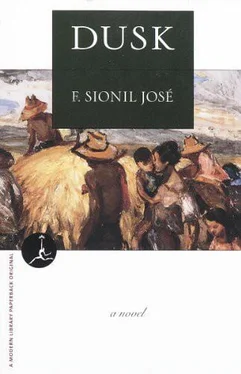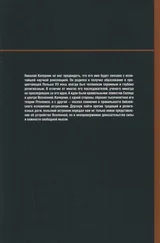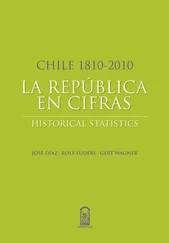All the rooms in the kumbento and the sacristy were no longer secret; he had grown up cleaning them, learning in them the cartilla and all that Padre Jose had imparted to him — knowledge and a sense of right as well. The old priest was patient; sometimes he would surrender himself to reverie. His bushy eyebrows would lift, his gray eyes glazed, and he would then start those soliloquies — about his sister and brothers, his parents, and that sparkling whitewashed village in Andalucía where he came from, the skies that were always blue, grapes as big as chicos, the golden oranges, the sherry, and most of all, the bread his mother baked. Mail took so long, and sometimes he read to all the acolytes letters that described Spain. Once it was a mighty nation, possessing an empire that stretched across the oceans; but in the decades past, this empire had dwindled. Though Padre Jose never told him, Istak came to realize, too, that the old man joined the priesthood not so much in service to God and country, but to escape the poverty of his own village. And this was what Istak wanted to do, too, what his father and mother had hoped would happen — that he would be a priest, not just so he could flee the drudgery of the village, but because he was the eldest, he could help his brothers and all his relatives who were mired in Po-on.
But the priestly life was not one of ease; even in his old age, Padre Jose worked hard, tending to the people, reaching those sitios where the Ilokanos seldom went, across Tirad to the land of the Bagos where they could be killed, their heads chopped off to decorate some heathen’s house. Padre Jose had prided himself on his order. “We are builders, Eustaquio; above all else, not just of buildings and churches, but of men. We will go wherever there are souls to rescue.” He would tell them then of Saint Augustine, of the first Augustinian in the country, Padre Rada. Padre Jose, without any family, had taken on a bigger one, not just the order to which he belonged, but the Ilokanos, whom he had grown to love.
Can one really love a people? And why not a village? A family — or even a woman? It had all become so remote, Istak’s discovery of his manhood and the desires that had shamed him once and at the same time warmed him to the pleasure that he would surely forgo if he became a priest. She was the eldest of Capitán Berong’s daughters — Carmencita, sixteen and already full-breasted, with flesh aching to be caressed beneath her long skirt. Just looking at her made him feel that all the beauty there was to behold in the world was in those red lips, the pert nose, and the cheeks that shone. Her two younger sisters — Filomena, fifteen, and Angela, fourteen — they were beautiful, too, but not as Carmencita was. They were not bright but they were all clever, and it was not difficult teaching them what he knew, a bit of history, arithmetic — and none of the homemaking arts that all women of high birth such as they would learn in the school in Vigan. It would all be wasted, of course, for Carmencita was just waiting for the right suitor to come to her father’s door so she could be married off to settle in some Ilokano town as mistress of a big stone house.
The sisters came to the convent in the afternoon, and stayed till the Angelus, when they went down the wide churchyard and the street, bringing with them their nubile laughter, and with Carmencita a presence that often was a challenge and a tease, for at sixteen, she knew she was desirable and if she wanted to, she could command men to do her bidding. He would have done so if only he had not been just a farm boy from Po-on. He believed then — as the old priest had taught him to believe — that with knowledge, righteousness, and faith in the Almighty, he would open the gates of Heaven to his countrymen, benighted as they were. But probing his thoughts, his own being, he had felt so small and worthless, for he reached the conclusion that, above all, with the priesthood, he would be able to rise from Po-on, and, perhaps, bring up with him his parents and brothers as well.
“You will not have a woman then,” Carmencita had told him pointedly. They were in the room behind the sacristy, a wide room with walls of thick coral stone and a floor of earthen tile. Outside, in the shaded patio, her younger sisters were playing patintero , while upstairs, Padre Jose was fast asleep, one of the younger acolytes — his arms perhaps already aching — pulling at the huge cloth fan that dangled from the ceiling to ward off the strangling heat of a March afternoon.
What would it matter if he would never know a woman? “If I become a priest, señorita,” he said diffidently, “but that is not for me to say.”
She pouted.
He started the lesson again: “There are really only so many elements on earth. Some are metals—”
“I don’t want to know about elements,” Carmencita said, bending down again to examine her right foot, visible below the hem of her white cotton skirt. Again, he could see the white mounds of her breasts and yes, his heart thumped — the small pink nipples. She straightened up immediately and caught him, and now, the knowing smile.
“Am I beautiful, Eustaquio?”
He could not answer; the blood rushed to his head, to his limbs, burning him, imprinting in his mind that image of her bosom. How shapely were the legs beneath that skirt? The hips?
“Well, are you not going to tell me?”
His throat was parched, “Yes, señorita,” he croaked. “You are beautiful.”
“My foot,” she said gazing at him, witch eyes beckoning while he seemed to sway. “Will you do me a favor? I twisted it this morning. Do you know how to massage a sprain? Weren’t you taught something like that, too?”
He shook his head.
“Please massage it,” she said, suddenly thrusting her right foot forward, baring a white, smooth leg up to the knee.
When he did not move, she repeated, “Please …”
He moved toward her as if in a daze, and then knelt. With trembling hands, he held her right foot and slowly started to massage it.
“Higher up the leg,” she said, her voice bright with pleasure. The touch of her flesh kindled in him this want so intense, so deep, it stirred him immediately. When she finally said enough, he still knelt, ashamed to rise knowing that she would see what she had done to him, the proclamation of his manhood.
He could not sleep that night. Carmencita had actually invited him, teased him, and he was shocked and at the same time ashamed of his feelings — he was a teacher and he had betrayed Padre Jose’s trust. He need not have worried more about temptation and lust and his own willful proclivity for sin. The following day, the young priest arrived, and upon seeing the three sisters that afternoon, he forbade Istak to teach them — he would do that himself now, and when the old priest was transferred to Bantay, the young priest moved the classroom for Capitán Berong’s daughters to the room upstairs, beside his quarters.
And it was there one afternoon that Istak had gone, and as was his custom with the old priest, he did not knock on the door; it was there that he saw just the legs — the white, creamy legs and between them, the hirsute legs of the young priest. They were behind the high cabinets where many of the records were filed. Istak did not close the door — he ran down the stairs and on to the church, where he knelt and prayed, telling himself that he did not see anything. And that evening, the young priest called him after the Angelus. He asked no questions, he merely told Istak his services were no longer needed.
The wheels of the cart, built of solid wood, were not oiled and they squeaked at every indentation in the path. Here was a woman, here was temptation again, and yet it was no longer the old temptation. It seemed as if he had known Dalin for a long time. Here was kinship, as strong as any that could bind two people together. She had listened passively at first, but now she seemed engrossed with everything he had to say. He told her of that inscrutable world whose fringes he had reached, the darkness — or was it light? — that had enticed him, the compulsion to know more, not just about faith and God, but of men, what made them what they were. He told her of his numbing sense of frustration when he was driven out of the kumbento , and how he would live in Po-on, to which he had become a stranger.
Читать дальше












